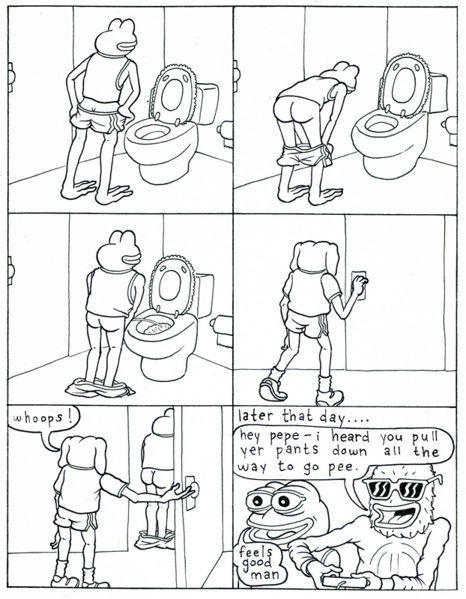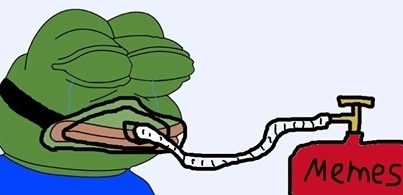This becoming-symbolic as logos, which only is in the course of its being ex-pressed, is what I call an ex-clamation, the noetic experience of the sensible is exclamatory. It exclaims itself before the sensible insofar as it is sensational, that is, experience of a singularity that is incommensurable, and always in excess. The exclamatory soul, that is, sensational and not only sensitive, enlarges its sense by exclaiming it symbolically.
-–Bernard Stiegler, Decadence of Industrial Democracies, Polity (2011): p133.
I begin my contribution to “Meme Culture, Alienation Capital, and Gestic Play” with a sorry admission: My memes suck. They never get shared. I don’t put my own name on them. I don’t even like them myself, because only a loser laughs at their own jokes. (In fact, I DO laugh at my jokes with my embodied voice. I just don’t “like-like” them, in the sense that one likes things on Facebook.) The result is that I am simply not contagious. I am pathologically healthy, if you will, at the art of transmission.
Or… perhaps I am an asymptomatic carrier, a Typhoid Mary of viral media, destined to transmit messages without any sense or control over their shape or trajectory. (But am I really? I often feel afflicted, fevered.) Thus, my lack of creative power is offset by the rich reserve of alienation capital I accrue. When in this mood, I suspect there is an entire universe of people like me, who lack all control over the informational epidemic, but remain doomed to spread it whether they are aware or not. The worst part is (and this is pure speculation), I think that this entire universe shivers under the dread of similar futility, dreams detached from their desires, yearnings replaced with cruel social fabrications. So caged, we kiss the database that dreams us, fearful that any bites we might give could lead to nightmares, and that nightmares might rouse us too suddenly into darkness and solitude. So, alienation appreciates, compounded in the knowledge that I have secret friends that fear to dream with me and that they have friends, like me, who fear the same. Alienation is a speculative bubble and we are deeply, deeply invested in it. And it bursts everyday, like a boil, our deadened defenses flowing from the festering infection caused by foreign entities embedded in the imagination.
JK
JK

Matt Furie. Boy's Club. 2008.
This thought keeps me from falling back to sleep. What I call the condition of metastatic equilibrium, or the conditions by which the very logic of meme-space has poisoned the well of mimetic desire. The idea of displacing the communicative power of the utterance by over-investing it with informational power and weakening the subject to the point in which the alienated informatics of the vector overwhelm the desire of the subject in order to render it a thing unto itself. To turn communication, not into the process oriented to its other, but into the locus of its own fecundity, to the point where its empty logic permeates the entirety of the organism…. To objectify.
What if what we call “viral media” is not viral at all? Sure, it is information. Sure it spreads. But what if it is a cancer? A code that has metastasized and spread to all tissues and turned them, essentially, into a body without organs… a giant engine of tumorous informational calamity? At some point, network growth is driven by the prospect of its other…. we have replaced the prospect with prospecting, aka data-mining, all intimations of the other, while effectively annihilating expressions of the other as expressed in social networks and consensus politics. The result is that the network logic is like a tumor that is consuming all energy, rapidly replacing the surrounding tissue under its logic of unrestrained growth—the organized corpus in metastable equilibrium replaced by the colonizing force of deindividuation.

This systemic totality should not be mistaken with the institutional targets of modernist critique (militarization, commodity, ideology, etc.). Though it has something in common with the old mass media that once sought to manufacture consent, anchor our collective reality, and channel the chaotic subjectivity of the multitude into what Gore Vidal lambasts as “received opinion.” The totality is what I think of as “metastasis” of form that exists in social media spaces. While the content of our digital everyday appears wild and wooly, the basic communicative relationships are structured by metadata to make them meaningful for machine intelligence. This metastasizing media is to the process of individuation (following Stiegler’s discussion of the psychic, social, and technical in metastable equilibrium) an overturning of subjectivity for a objective, machine readable form. Hence, it hijacks the informational content of meme transmission, replacing the indeterministic character of epiphylogenesis with the determined character of epioncogenesis, or the organization of the body against itself, a theft of the mechanisms of social life with a new informational mission, that which simply expands itself at the expense of the social.
Rather than think of the Modern and what comes next as the watershed moment, we need to shift back the rise of Modernity itself and think through other forms of infectious relation. And then map the effects of those forms into new media spaces. Hence, we need to think through virality, not simply as a model of transmission, but as transmission activated by fortuitous mutations. Hayles is right to hope that electronic literary forms are hopeful monsters. The dead virus has reached a state of ubiquity and stasis. The mutable virus is the one that spreads. Sometimes it diminishes us. Sometimes it strengthens us. But if it finds a pathway to transmission, it is nevertheless significant. And in its best cases, such messages are feral, excessive, unpredictable, etc.

Matt Furie. "Pepe the Frog: To Sleep, Perchance to Meme." The Nib. 2006
So, creative new media is a two edged sword. It is not enough to marvel at its process, though knowledge of process is necessary for survival. To elaborate on the viral metaphor, we might ask what is necessary is to develop a comprehensive approach to informational infection?
We must protect ourselves against destructive infections, though our precautions cannot be worse than the disease (Exposure to attenuated forms? Sanitation and disinfection? Quarantine?). We must develop therapies for those infections which rip through our cognitive spaces (Bed rest? Anti-viral therapies? Homeopathic cures?). And finally, we must figure out what good, if any, can be had from experimental approaches to these informational forms. Just as researchers hope for oncolytic viruses that can attack cancer (and/or stimulate immune response to cancerous cells), we need to think about our meme as tools of subversion, aberration, multiplicity, externality.
It is the third point that I would like to explore in this space. How does one struggle against the metastatic character of identity formation, expression, and sociality in digital media spaces? How can gestic media work from within the space of alienation capital to restore health to the social body? What poetic means can be created, knowing what we know about industrialized models of sociality, to struggle against the proletarianization of imagination? Can we create new gestures, memes, and forms? Can we escape the hegemony of metastatic media culture? Can we make anything?
JK.
Of course…
Talan Memmott
Davin Heckman
Claire Donato
Sergio Figueiredo
Jeremy Hight
Jeff T. Johnson
Kelly Lydick
Mark Marino
Craig Saper
Orchid Tierney
Erik Zepka